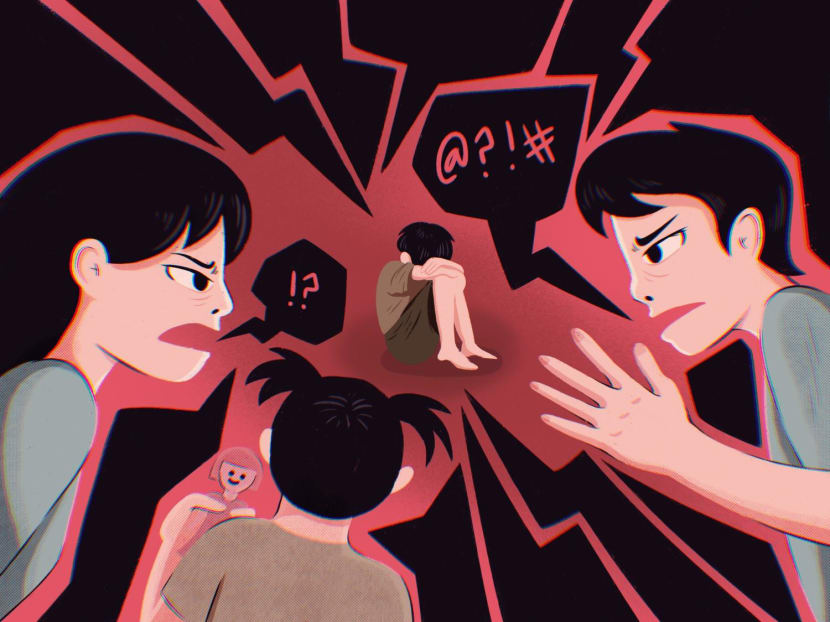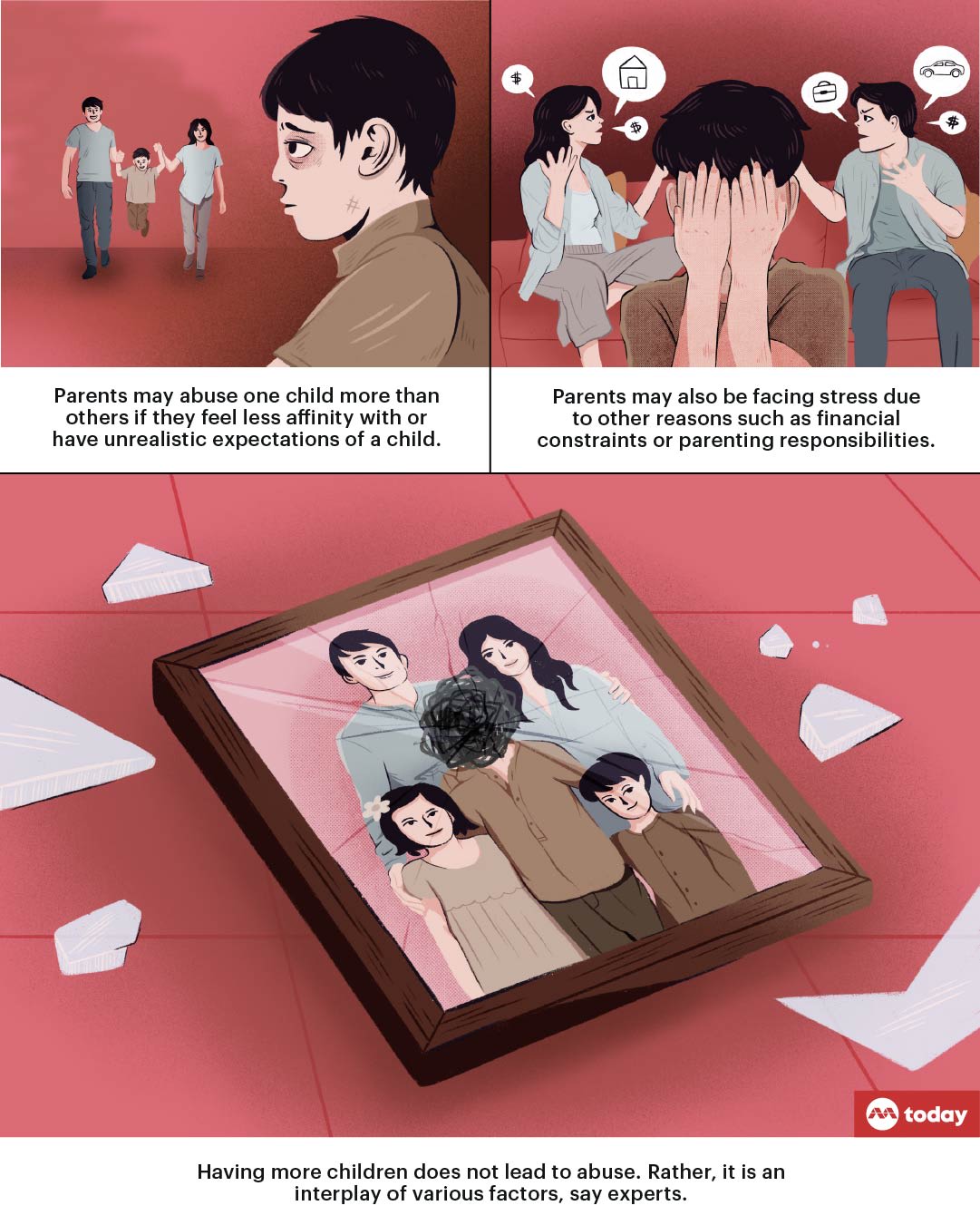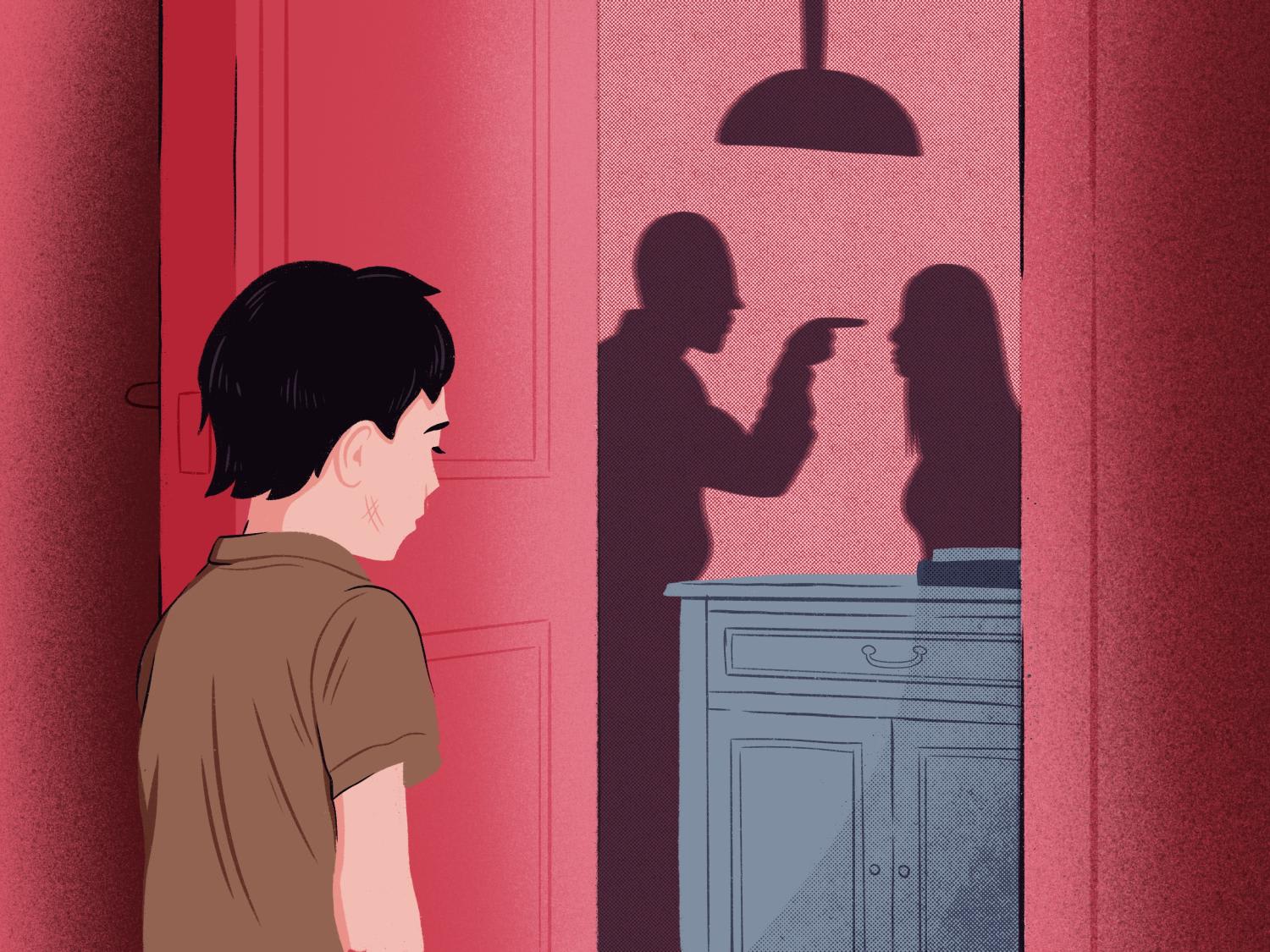Child abuse cases in larger families: Why parents may pick on one child and who's more at risk
SINGAPORE — A spate of child abuse cases here in larger families has led to the question: Are parents more likely to ill-treat one particular child over their others? Experts interviewed by TODAY said the first-born or a step-child may be more at risk of abuse.

- A spate of child abuse cases here in larger families has led to the question: Are parents more likely to ill-treat one particular child over their others?
- The risk of parents abusing one child more than others in a large family could increase if parents lack affinity with one particular child or have unrealistic expectations of him or her, experts told TODAY
- Parents may also resort to physical punishment if they find it difficult to manage the behaviour of the child, the experts said
- However, psychologists and social workers said that having more children does not increase the risk of child abuse
- The risk of abuse depends on an interplay of various factors, including social support and the mental health of parents
SINGAPORE — A spate of child abuse cases here in larger families has led to the question: Are parents more likely to ill-treat one particular child over their other children? Experts interviewed by TODAY said the first-born or a stepchild may be more at risk of abuse.
The experts added that the reasons parents might pick on one particular child include a lack of affinity with the child, unrealistic expectations of him or her coupled with various stressors faced by the parents.
However, they said there is no documented evidence that child abuse cases are more likely to occur in families with three or more children than in smaller families with one or two children. Child abuse results from an interplay of various factors, they added.
The instances of abuse in larger families which have hit the headlines include a case where a stepfather pleaded guilty last month to abusing his 11-year-old stepdaughter to death.
Among other things, he would cane her for sleeping instead of studying and made her finish a chilli padi within five minutes to punish her for not studying.
He and his wife had three other children — one son from their relationship and two other sons from the woman’s previous relationship.
CHILD ABUSE CASES INVOLVING LARGER FAMILIES
- A five-year-old girl died in 2017 after being assaulted by her father for refusing to exercise. Before that, she was made to live in a bathroom with her younger brother in a one-room flat. Besides her father and younger brother, the victim also lived with her stepmother and two half-siblings.
- Last month, a stepfather pleaded guilty to abusing his 11-year-old stepdaughter to death. Among other things, he made her finish a chilli padi within five minutes to punish her for not studying. He and his wife had three other children — one son from their relationship and two other sons from the woman’s previous relationship.
- In 2020, a couple was jailed for 27 years for scalding their five-year-old son until he died. The couple, who also had other children, confined the boy to a pet cage, pinched him with a pair of pliers and hit him with a broom.
- A mother tortured her two-and-a-half-year-old, and the child’s remains were found in a metal pot in a Chin Swee Road rental flat five years later in 2019. The couple had seven children.
- In 2021, a mother was jailed for three years for physically abusing her two young daughters. Among other things, she had broken her older daughter’s front teeth by slapping and kicking her, and pinched her younger daughter several times and slapped her face repeatedly. She also had a young son but did not beat him.
Figures by the Ministry of Social and Family Development (MSF) show that the number of investigations into child abuse cases shot up from 383 in 2012 to 2,141 in 2021.
The increase applies across the board to cases of non-sexual physical abuse, sexual abuse or child neglect.
MSF said the increase in cases from 2020 to 2021 was mainly due to more referrals from its community partners, such as family service centres.
However, there is no local data to indicate the size of households involved in child abuse cases.
WHY PARENTS MAY PICK ON ONE CHILD
In interviews with TODAY, social workers and psychologists cited various factors that could drive parents to abuse one child more than others.
Dr Kit Phey Ling, a senior lecturer from the National Institute of Education (NIE), said that parenting inexperience could lead to unrealistic and unmet expectations by parents of a child.
For example, when a child's behaviour does not meet the parents’ expectations, they may punish the child.
Such instances are more likely to occur with the first child in the family or a stepchild as parents do not yet realise that their expectations of their child are unrealistic, said Dr Kit, who is from NIE's psychology and child and human development academic group
However, when mothers and fathers become more familiar with their parenting role, they may realise that their children’s behaviour is normal and adjust their parenting methods accordingly, she added.
That said, parents may continue to abuse the first-born child even after having other children if they lack insight into the reasons and consequences of their behaviour, said Dr Kit.
"This is usually due to a lack of parenting skills, difficulties managing their own emotions and expectations, or because they are simply doing what their own parents did to them," she added.
A lack of affinity with one child, or greater affinity with their other children, was another reason why parents might abuse one child more than others, said psychologists and social workers.
Parents could form greater affinity with one child more than others due to a variety of reasons, including shared interests, physical looks, or the child's temperament or behaviour.
Using the example of behaviour, Ms June Fong, a senior forensic psychologist at psychology clinic Promises Healthcare, said that some parents may abuse their children if they are unable to cope with their child's behaviour.
“Research has also shown that the more difficult behaviours a child presents with, the harder they may be to manage, and this is where caregivers might be tempted to resort to physical punishment to elicit compliance,” she said.
For instance, recent research had shown that children with attention-deficit hyperactivity disorder (ADHD) are at higher risk of abuse, she added.
In some abuse cases, the stepparent also abused the stepchild.
Psychologists said that this can be attributed to the so-called “Cinderella effect” — a phenomenon where a child is more likely to be mistreated by a stepparent rather than a biological parent.
A lack of shared genetics and attachment from birth, and resentment over having to care for a stepchild as their own were among some reasons to explain the Cinderella effect, experts said.

OTHER FACTORS LEADING TO ABUSE
However, psychologists and social workers were also quick to note that abuse cannot be attributed to one reason alone, but an interplay of various factors.
There is also no strong evidence to show that parents with more children are more likely to commit abuse, said Dr Gerard Chung, an assistant professor of social work from the National University of Singapore.
While research has found larger households to be a risk factor for child abuse, it is not as strong as factors such as social support, family functioning or the mental health of parents, he said.
Likewise, Ms Fong of Promises Healthcare said that having multiple children increases the risk of abuse only insofar as the additional children add stress to the family system.
However, it is ultimately not about the individual factor — be it poverty or family size — but the impact that these factors have on the parents.
“For some parents, if the difficulties outstrip their resources and ability to cope with the vicissitudes of parenting and stepparenting, they may resort to the quickest and most expedient way they know to gain obedience, assert authority or reinstate power — through violence,” she said.
Ms Lydia Tan, a principal social worker at social service agency Care Corner Singapore, also agreed that having multiple children does not increase the tendency of parents to abuse the children.
Factors such as the characteristics of adults and children could also contribute to the risk of child abuse and no one factor determines it, she said.
Relevant characteristics of adults would include their mental health and ability to provide stable care for a child without conditions, while characteristics of a child which could have a bearing would include whether they appeal to their parents such as through their behaviour.

INTERVENTIONS FOR LARGE FAMILIES
On whether social service agencies intervene further to spot potential abuse in larger families, Ms Tan of Care Corner Singapore said that large families in themselves are not seen as having higher risk compared to other factors such as parents with substance abuse or parents with a history of aggression.
She said that in such cases, agencies conduct more frequent check-ins with families when there are risk factors that can impact parental capacities.
In working with couples or families, the social service agency also tries to meet each member of the family, including children, to find out how they are doing.
Noting that stress could lead to abusive behaviour, Dr Praveen Nair of Raven Counselling and Consultancy suggested that a nationwide study to reduce the causes of stress, increasing mental health awareness, greater social mobility and education about parenting could help to reduce the risk of abusive behaviour.
Dr Chung of NUS said that programmes to support families at different stages in their lives, such as when they have newborns or when their children go to school, could help to prevent abuse.
Members of the community can also be alert for signs of abuse, such as changes in a child’s behaviour, said psychologists and social workers.
Corporal punishment should also not be accepted in society as this could lead to abuse, they added.
WHAT MSF SAYS
In response to TODAY’s queries, MSF said that there are various family and parenting-related services and programmes that the ministry has put in place to support parents and prevent child abuse.
For example, it offers the Positive Parenting Programme to equip parents of children aged up to 16 with techniques to promote psychological, social and emotional competence.
In response to a letter writer to national daily The Straits Times on July 17, Mr Yoganathan Ammayappan, MSF's senior director of the rehabilitation and protection group, said that its case officers also work with the child and family to address safety and risk concerns if they find that the child is unable to remain in the family home safely.
Officers use evidence-based decision-making tools to assess if the child can be safely reunited with the family.
“Despite our best efforts, it is not possible to guarantee that there will never be a relapse of abuse,” he wrote.











